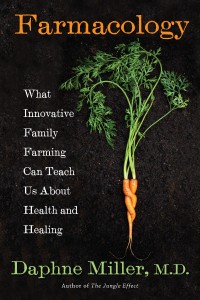Seven Ways to Connect with the Farm

The last few generations of human beings were, and are, the first in history to be so profoundly disconnected from our food sources. According to Daphne Miller, M.D., this is not just an abstract, philosophical problem. There are both physical and psychological consequences that we suffer as a result of eating only packaged, sanitized food from distant, unknown places.
So how can we identify healthy, sustainably farmed food, and use it to boost our health? Here are seven practical ways:
- Eat Dirt and Bugs.
Well, not literally . . . but I encourage you to not be too compulsive about scrubbing your farm-fresh produce that is grown in healthy soil. Who knows what beneficial bacteria and minerals might be coming along for the ride? - Make sure your food has a story.
Try to buy food that is in season, and has a sign or label that describes where it was grown or who grew it. Whether or not this produce (or meat) is certified organic, this kind of food is more likely to be sustainably farmed. You are more likely to find this kind of food in neighborhood supermarkets, farmer’s markets or by subscribing to a CSA (community supported agriculture) program. Don’t be afraid to ask the produce manager in your favorite market to start buying locally. If enough shoppers make this request, it will begin to happen. - Shop with your taste buds and your nose, not with your eyes.
We tend to go for the most perfect looking produce even though these uniform, unblemished specimens are usually the least tasty and nutritious (and grown in the least healthy soil). Choose produce that smells good and has a full flavor even if it’s a little wonky and bruised. Also, when it comes to taste and nutrition, a Red Garnet peach will beat your standard supermarket peach any day, and a prickly seeded spinach will trump the usual rubbery commercial spinach… so choose lesser-known varieties of fruits and veggies when they are available. - Cook.
Preparing your meals from scratch is a great way to get in touch with the products of a healthy farm and to take charge of your health. - Give Back to the Farm.
If you compost your waste or contribute it to a central composting system, then it will be returned to the soil where it will, once again, nourish the plants. Conserving your daily use of water so that it can be diverted to agriculture is also a great way to give back to the farm. Remember, we are all part of one big ecosystem and our health is directly connected to the health of the soil. - Protect the soil like you protect your body…and vice versa.
Avoid cosmetics, personal care products cleaning detergents, paints, pesticides and sanitary wipes that contain chemicals such as triclosans, VOCs, parabens, PBAs, PVCs, and lye. Look for natural alternatives. Grapeseed extract, for example, is a powerful plant-based antiseptic , vinegar makes the best cleaner, shea or cocoa butter are awesome moisturizers and baking soda is an excellent shampoo. Use antibiotics, steroids and other medications judiciously. If misused, these drugs can be directly harmful to our bodies, and when they get into our groundwater they contaminate our soil and our food. - Bring the farm to you.
Be active in greening your community. Help bring gardens to front yards, schools, senior centers, community centers, religious gathering places and even the workplace. Research shows that growing fresh vegetables inspires a community to eat more veggies and also has a number of other surprising health benefits including lowering crime rates, increasing community involvement, lowering alcohol use, helping seniors stay healthy, and helping students succeed in school.
Learn more: Our Soil, Ourselves
By Daphne Miller, M.D.
Daphne Miller, M.D., a graduate of the Fellowship program of the Arizona Center for Integrative Medicine, is a practicing physician, author and professor of family medicine at the University of California, San Francisco. For other “farm to body” lessons on cultivating health and vitality, see Dr. Miller’s book, “Farmacology; What Innovative Family Farming Can Teach Us About Health and Healing.“









